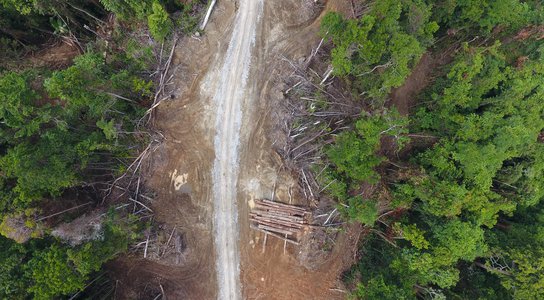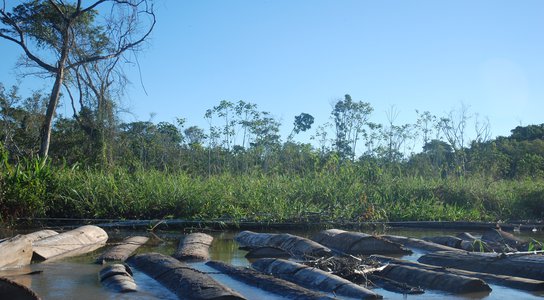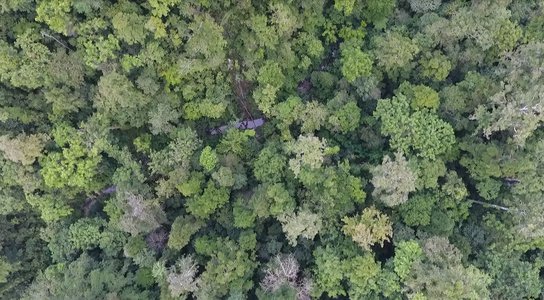Ahead of the Asia-Pacific Economic Cooperation Leaders’ Summit in Papua New Guinea, local civil society groups deliver letter to President Xi Jinping calling on China to crack down on its import of millions of tonnes of risky and illegal wood
Monday 12th November - Civil society groups in
Papua New Guinea (PNG) have today delivered a collective letter to President XiJinping – calling on him to urgently review the current lack of regulation on
illegal wood entering China.
In 2016, PNG provided 29% of China’s tropical log imports, making it the country’s single largest supplier. But despite being the world’s largest consumer and manufacturer of wood and wood products, China has no regulation to keep illegal timber from entering its borders.
And recent reports have shown evidence that large quantities of China’s wood imports come from illegal operations in PNG.
The call from the groups comes as all eyes focus on PNG ahead of the APEC Summit, which President Xi Jinping is also attending. Under China’s flagship Belt and Road initiative, it has already committed to billions of dollars in infrastructure and agricultural projects across PNG.
The letter – signed by a number of civil society groups from PNG including the Center for Environmental Law and Community Rights and ACT NOW – states that both the governments of PNG and China have failed to act while the country’s globally significant forests are being destroyed.
It praises China’s vision of an ‘ecological civilization’ – but urges that the country place the same level of attention on its ecological footprint overseas as it does at home, and asks it to critically ensure that materials it sources from abroad are legal and sustainable.
The letter highlights the devastating effect of illegal logging on the forests of PNG, and the resulting climate impacts and damage to biodiversity and the livelihoods of Papua New Guinean citizens.
Peter Bosip, Executive Director of the Center for Environmental Law and Community Rights, said:
“China’s influence in PNG is strong and growing. PNG is one of the newest members of the Belt and Road Initiative, and major related investments in infrastructure, transportation, and agriculture have recently been announced throughout the country.
“But meanwhile, the forests that sustain our livelihoods and culture are being liquidated. For decades now, our own government has failed to enforce its own law and protect our forests and our people’s livelihoods. Since most of PNG’s logs are exported to China, we are calling on China to help end this illegal trade.”
Gary Juffa, Papua New Guinea MP and Governor of Oro Province, said:
“President Xi Jinping has called for Chinese citizens to defend what he called “ecological red lines”: natural areas that are too valuable to exploit. I couldn’t agree more. The problem is that while China protects its own environment, its behavior abroad is driving environmental devastation in countries like PNG. China has not yet extended its own internal best practices to how it sources raw materials in other countries, which means that illegally produced timber from PNG continues to feed China’s manufacturing sector. This needs to change now.”
Lela Stanley, Policy Advisor at Global Witness, said:
“China is taking steps to clean up its domestic manufacturing sector and polluted environment, and positioning itself as a global leader on climate change. But if it’s serious about its vision of an ‘ecological civilization,’ it needs to ensure the raw materials like timber that it sources abroad are produced legally and sustainably.”
/ ENDS
Contacts
Notes to editor:
- You can see the original letter here.Interviews, additional photographic and video materials (including drone footage of heavily logged areas in PNG, and PNG villagers discussing the negative impacts of logging on their lives) are available on request. Please contact Heather Iqbal on +44 7828 505 758 or through [email protected].
- The report ‘A Major Liability’ explains how responsible buyers cannot rely on paperwork alone to assure themselves that timber has been cut legally and provides recommendations for Papua New Guinea and the buyers of its timber –notably China – to combat this illegal trade.
- more information on Global Witness’ work on Papua New Guinea, please refer to our report from 2017, ‘Stained Trade’. This revealed for the first time, how companies along wood product supply chains leading through China are failing to screen out illegal timber, the risks this creates for U.S. companies, and the devastating impacts the trade is having on people in PNG.
- About Global Witness: Global Witness investigates and campaigns to change the system by exposing the economic networks behind conflict, corruption and environmental destruction.
You might also like
-
Report A Major Liability
As China continues to import huge volumes of timber from Papua New Guinea, its continued failure to regulate against illegally produced wood is putting its own reputation at risk.
-
Blog post China’s baby steps towards outlawing illegal timber sound a warning for Peru
Anyone interested in the Amazon and the world’s other tropical forests should be concerned about China.
-
Briefing China's high-risk timber trade: Lessons from Papua New Guinea
This brief provides recommendations for carrying out effective checks, known as due diligence, on the Chinese timber supply chain drawing on insights from Global Witness investigations into illegal logging in PNG.